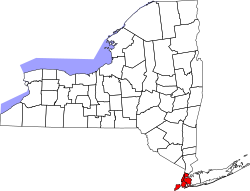New York City Parks Enforcement Patrol
| New York City Parks Enforcement Patrol | |
|---|---|
| Abbreviation | NYC PEP |

Patch of the New York City Parks Enforcement Patrol
|
|
| Agency overview | |
| Formed | 1981 |
| Legal personality | Governmental: Government agency |
| Jurisdictional structure | |
| Operations jurisdiction* | City of New York in the state of New York, USA |
 |
|
| Map of New York City Parks Enforcement Patrol's jurisdiction. | |
| Legal jurisdiction | New York City |
| General nature | |
| Specialist jurisdiction | Environment, parks, and-or heritage property. |
| Operational structure | |
| Parks Enforcement Patrol Officers | 400+ |
| Deputy Commissioner, Urban Park Service and Public Programs | Adena Long |
| Agency executive | Edwin Rodriguez, Inspector, Parks Enforcement Patrol |
| Facilities | |
| Dogs | mounted |
| Website | |
| NYC Department of Parks Official Site | |
| Footnotes | |
| * Divisional agency: Division of the country, over which the agency has usual operational jurisdiction. | |
The New York City Department of Parks and Recreation maintains a unit of full-time and seasonal uniformed officers who enforce parks department rules and regulations, as well as New York State laws within the jurisdiction of New York City parks. Established in 1981, NYC Parks Enforcement Patrol officers patrol on foot, bicycle, horseback, in marked sedans, vans, scooters, carts, ATVs, SUVs and trucks. Parks Enforcement officers are responsible for protecting NYC Park land, waterways under the jurisdiction of the Department of Parks and Recreation, city owned monuments, and public pools. PEP officers are responsible for enforcing quality of life laws, the New York City Administrative Code, New York State Penal Law, Parks’ Rules and Regulations, and acting as Parks’ ambassadors.
The history of the Park Enforcement Patrol Officers can be traced back to 1919, when the concept of the Parks Enforcement Patrol was first thought of by Bronx Parks Commissioner Joe Hennessy, who reported in the "1919 Annual Report of the Department of Parks" the "necessity of a proper protective force" to be established. The following year in his 1920 annual report to the mayor, Commissioner Hennessy once again pushed for a full-time park police force. On page 16 of the 1920 annual report he wrote that "Vandalism is ever present. It can never be checked until the Parks Department has a force of keepers with police authority" and he recommended that the "Park protectors should be under control of Park Commissioners absolutely". In 1920, legislature was passed for the creation of a force of park keepers for NYC parks but the city refused to approve it and authorize funding.
In an effort to show the mayor the effectiveness of a park patrol force in hopes of having a full-time force established, Commissioner Hennessy created volunteer park inspectors (later called "Auxiliary Park Inspectors") to patrol the Bronx parks during the day. According to his "1919 annual report of the Department of Parks", the first park inspector he appointed was Inspector William Blackie. Inspector Blackie was injured on Columbus Day 1919 while attempting to arrest two men poaching song birds in Van Cortlandt Park.
Despite the objection of the New York City Police Department, Commissioner Hennessy established the first Park Patrol Harbor unit when he obtained two small motor boats from the Navy which he immediately put into service and had park staff patrol the waterways of the Hutchinson River.
...
Wikipedia
